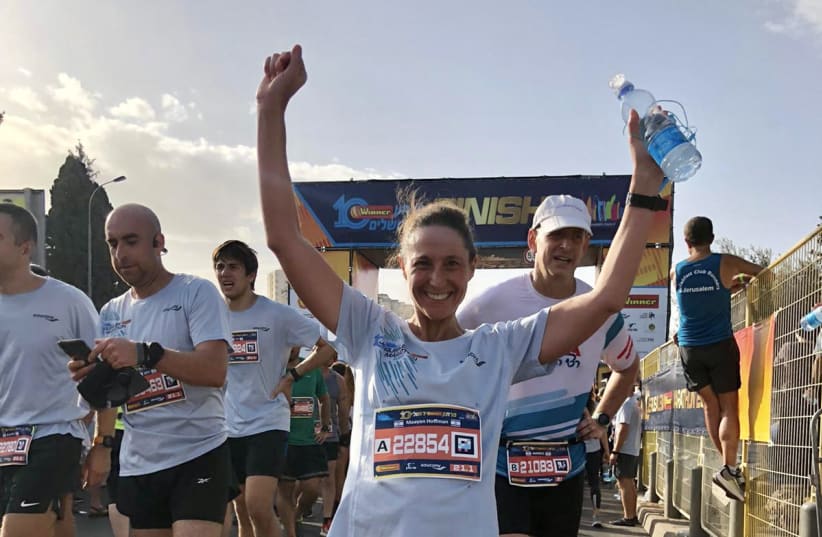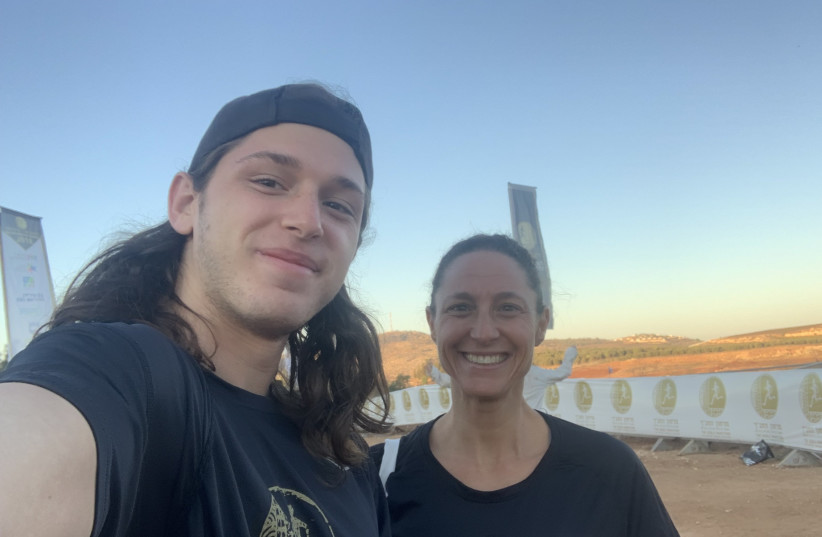Running through the streets of Israel is an enmeshing of the past and present of the Jewish people, and a window into the promise of our future.
In the course of eight days, I had the privilege (and pain) of running two half-marathons – one in Jerusalem and the other through the hills of the Binyamin district in the Shomron.
The races were collectively 42.2 kilometers long, and they started around 45 kilometers apart. The Jerusalem run was on the city’s streets and ancient stones, and the Bible run was a jungle fight against the mud and rocks and gravel of the fields of the West Bank.
But both experiences were races through personal and collective time.
A highlight of the Jerusalem Marathon is when we enter the Old City, with the smell of baking sesame bagels, cigarettes and wet stone trailing beside us. Armenian and Jewish residents of the quarters smile with toothless grins. A homeless woman shakes her cup, and the ancient cream stones are slippery under our feet.
The sun is always up by then and beaming down from between the old buildings and other structures that wind their way through the Old City walls.
Modern gadgets and souvenirs, bookstores and freezers with ice pops and soda are next to historical weaves and paintings, women in hijabs and Armenian priests in black robes with large copper crosses around their necks.
For me, the Old City is also the memory of getting engaged to my husband in the Kotel tunnels at the spot he told me was the closest one could get to the Temple Mount, and of bringing my baby daughter (who is now five) on her first visit to the Western Wall when she was only days old – our first outing.
It is also the tour I took with four of my children soon after we moved back to Israel, through all of the city’s quarters, with Abraham Hostel – where I taught them that the country is diverse and complicated and intense and wonderful, and that now this ancient chaos belonged to them.
The race takes you by the Knesset, where our parliamentarians fight like in the days of the Sanhedrin – and much worse. And by the President’s Residence, where I have so many memories of Jewish and Christian media summits and visits to hear the former president speak or receive the Israel Democracy Index or build bridges between Jews in Israel and the Diaspora.
It is minutes from that residence, at the Israel Democracy Institute, where I worked in my first job on returning to Israel after a hiatus in the States for almost 10 years, where I struggled daily to remember my Hebrew and pushed myself to relearn the workings of our parliamentary and legal systems. It is also around the corner from David Marcus Street, the steep hill that I would run up one, two and eventually 10 times in a row while training for my first Jerusalem 10K, which I completed six years ago with my son.
This year, the race took us up Daniel Yanovski Street via Hebron Road, where the blue-and-white Arab buses run – the ones I took so often to Bethlehem in my first year back in Israel for a project I never got to write, as the “Knife Intifada” erupted and I became too afraid.
At the top of Yanovski, my children and husband waited for me, cheering loudly – my five-year-old, Liori, on her father’s shoulders. Ten years ago, I could not have pictured being back in the Holy Land, let alone the smiling faces of all my kids so grown up and cheering me on as I ran through the streets of the city we call home.
Yanovski is less than a kilometer from my house, the house we purchased with a view of the Dead Sea and a dream of living in and loving in Jerusalem and eventually giving it to our offspring – a piece of heritage painted in modern shades of turquoise and yellow and pink.
THE NEXT WEEK, I was admittedly not too keen on running a second half-marathon after a challenging week at work that left me emotionally and physically drained.
But my 18-year-old son was insistent that we had committed to racing in the Bible Marathon, and so we left Jerusalem at 5 a.m. and drove to Shomron.
The hills of our biblical heartland are stunning at that hour, with the sun rising at 6 a.m. above the fields.
The Bible Marathon is straight out of the Torah and takes place where “a man of Benjamin,” as described in I Samuel 4:12, ran the world’s first marathon, according to Jewish tradition.
The story goes like this: Shortly after the Jews entered the Land of Israel, they fought a battle against the Philistines and were defeated. Some 30,000 Jewish soldiers were killed, including the two sons of the high priest Eli. The Ark of the Covenant was taken.
A man from the tribe of Benjamin ran from the battlefield to Shiloh to spread word of the terrible defeat. This man, who according to Jewish tradition was the young King Saul, ran 42 kilometers, which is also the official length of the Olympic marathon, decided upon in 1908 at the London Olympic Games.
Though the ark was stolen, Shiloh maintained its status as the capital of the Jewish people for 369 years, beginning after the conquest of Canaan until King David established Jerusalem as the eternal capital of the Jewish nation. Shiloh is mentioned 34 times in the Bible.
But admittedly, this year’s Bible Marathon was not the one that I had run before. The entire course was on mud and rocks and gravel hills – unpaved and coarse and tiring. By the time we started running at 7 a.m., the sun was hot. And while the views were spectacular, it was hard to look up while staring at my feet to ensure I did not trip and fall on the difficult trail.
I spent the first 10K cursing under my breath at my son, who seemed to think it was a good idea for a woman in her mid-40s to run two half-marathons in one week, with several drives to Tel Aviv and plenty of stress.
I spent kilometers 10 to 18 celebrating that I was going to make it, and that by turning out for the run, I had once again proved to myself that I was strong – physically and mentally – and that success is built on hard work and determination and a little bit of insanity.
But by the end of the race, I was back to cursing my son.
When it was all over, though, I was sore but happy.
We had run through the vineyards where I invest in a boutique winery and do my part to plant the land that God gave us. I recalled my many trips to unnamed hilltops labeled only with numbers where artisans were living and were willing to share with me their crafts over a cup of tea for articles I wrote for them.
THE WINNER of the Jerusalem half-marathon was a haredi mother of five. The winner of the Jerusalem Marathon was an Ethiopian immigrant. And the winner of the Bible Marathon was an immigrant from Sudan.
The Jewish homeland is a melting pot and a mosaic, a coming together of the Jewish people from around the world.
Living in Israel in 2021 is sometimes more grueling than the winding dirt paths of Shiloh, but it is a privilege.
These races were on October 29 and November 5 because they had been pushed off due to COVID-19.
On the one hand, the races felt misplaced, behind the times, meant to be run earlier, in the past.
On the other hand, they were like a starting line – a kicking off of our post-pandemic future that is now, the next chapter of our collective and personal lives.
The writer is head of strategy and senior health analyst for The Jerusalem Post.

